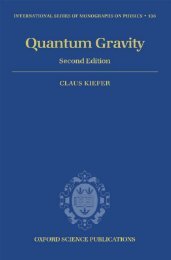Three Roads To Quantum Gravity
Three Roads To Quantum Gravity
Three Roads To Quantum Gravity
You also want an ePaper? Increase the reach of your titles
YUMPU automatically turns print PDFs into web optimized ePapers that Google loves.
34 THREE ROADS TO QUANTUM GRAVITY<br />
universally accepted physical interpretation of it. There are<br />
many different points of view about what quantum theory<br />
really asserts about reality and its relationship to the<br />
observer. The founders of quantum theory, such as Einstein,<br />
Bohr, Heisenberg and SchroÈdinger, could not agree on these<br />
questions. Nor is the present-day situation any better, for now<br />
we have extra points of view that those guys, smart as they<br />
were, were not imaginative enough to foresee. There is now<br />
no more agreement about what quantum theory means than<br />
when Einstein and Bohr ®rst debated the question in the<br />
1920s.<br />
It is true that there is only one mathematical formalism for<br />
the quantum theory. So physicists have no problem with<br />
going ahead and using the theory, even though they do not<br />
agree about what it means. This may seem strange, but it does<br />
happen. I have worked on projects in quantum gravity where<br />
everything went smoothly until the collaborators discovered<br />
one day over dinner that we had radically different understandings<br />
of the meaning of quantum theory. Everything went<br />
smoothly again after we had calmed down and realized that<br />
how we thought about the theory had no effect on the<br />
calculations we were doing.<br />
But this is no consolation to the layperson, who does not<br />
have the mathematics to fall back on. With only the concepts<br />
and principles to go on, it must be very disconcerting to<br />
discover that different physicists, in their different books,<br />
offer very different versions of the basics of quantum theory.<br />
<strong>Quantum</strong> cosmology helps rather than hinders because, as<br />
we are about to see, it limits the scope for possible interpretations<br />
of the quantum theory. If we stick to the principles<br />
introduced in the ®rst two chapters, several of the approaches<br />
to the interpretation of quantum mechanics must be abandoned.<br />
Either that, or we must give up any idea that quantum<br />
theory can be applied to space and time. The principle that<br />
there is nothing outside the universe and the principle that in<br />
the future we shall know more do point to a new way of<br />
looking at quantum theory that is both simpler and more<br />
rational than many of the older ideas. As a result of applying<br />
quantum theory to cosmology, there has emerged over the last


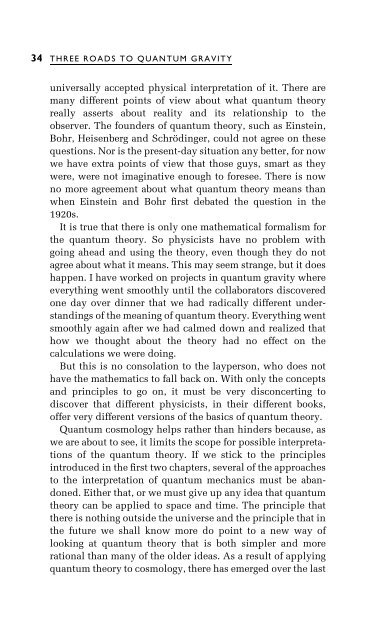
![arXiv:1001.0993v1 [hep-ph] 6 Jan 2010](https://img.yumpu.com/51282177/1/190x245/arxiv10010993v1-hep-ph-6-jan-2010.jpg?quality=85)

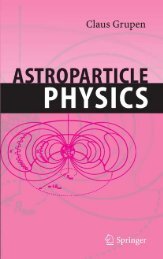
![arXiv:1008.3907v2 [astro-ph.CO] 1 Nov 2011](https://img.yumpu.com/48909562/1/190x245/arxiv10083907v2-astro-phco-1-nov-2011.jpg?quality=85)
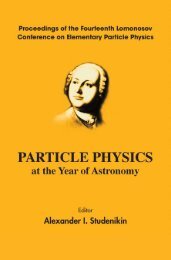
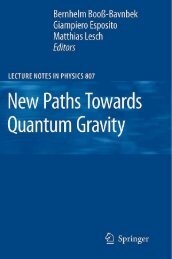
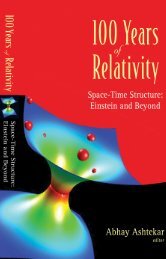

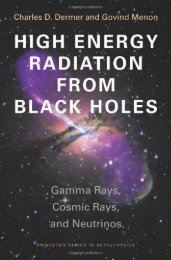
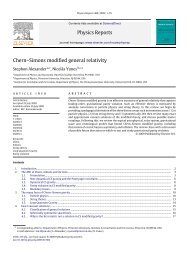
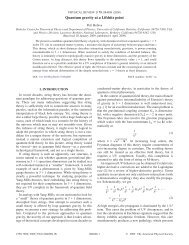
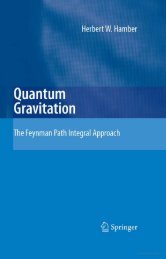
![arXiv:1002.4928v1 [gr-qc] 26 Feb 2010](https://img.yumpu.com/41209516/1/190x245/arxiv10024928v1-gr-qc-26-feb-2010.jpg?quality=85)
![arXiv:1206.2653v1 [astro-ph.CO] 12 Jun 2012](https://img.yumpu.com/39510078/1/190x245/arxiv12062653v1-astro-phco-12-jun-2012.jpg?quality=85)
